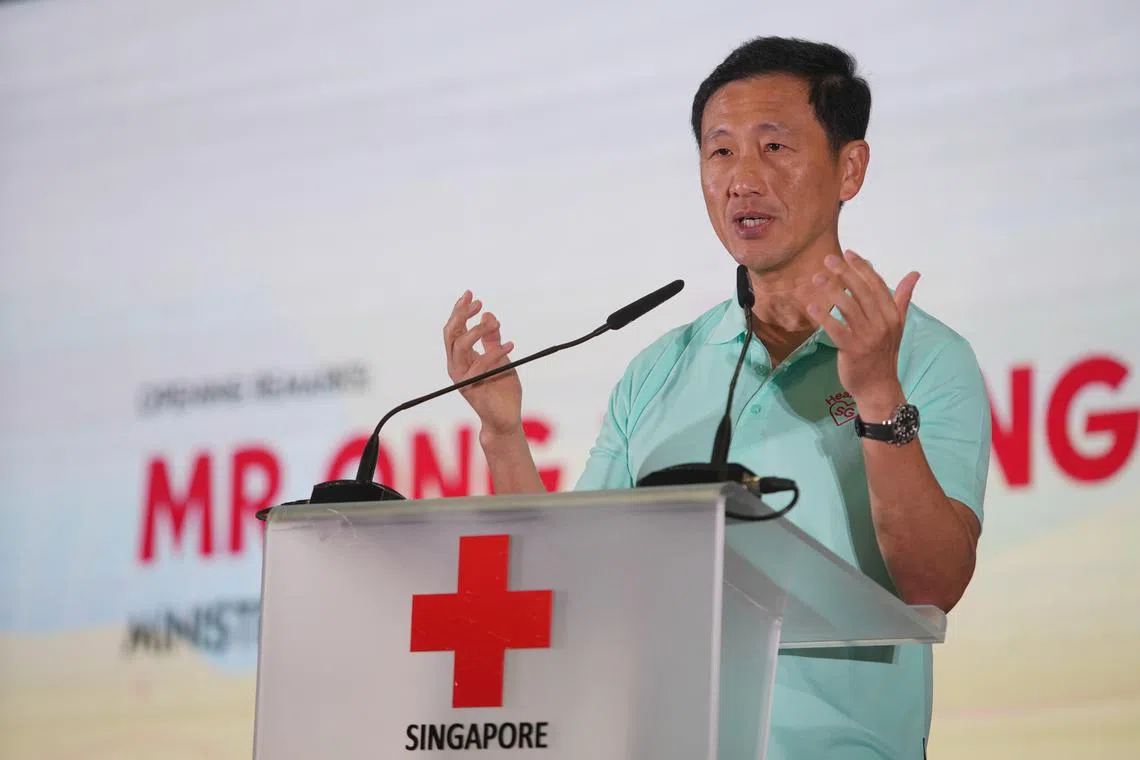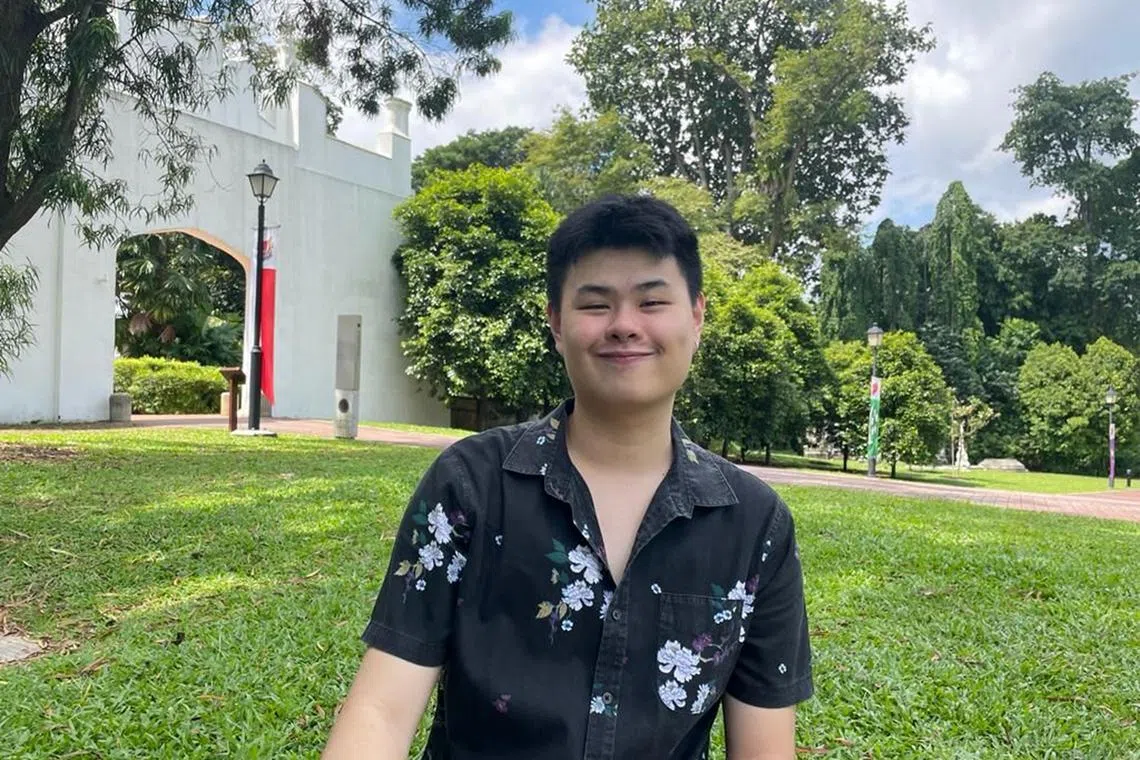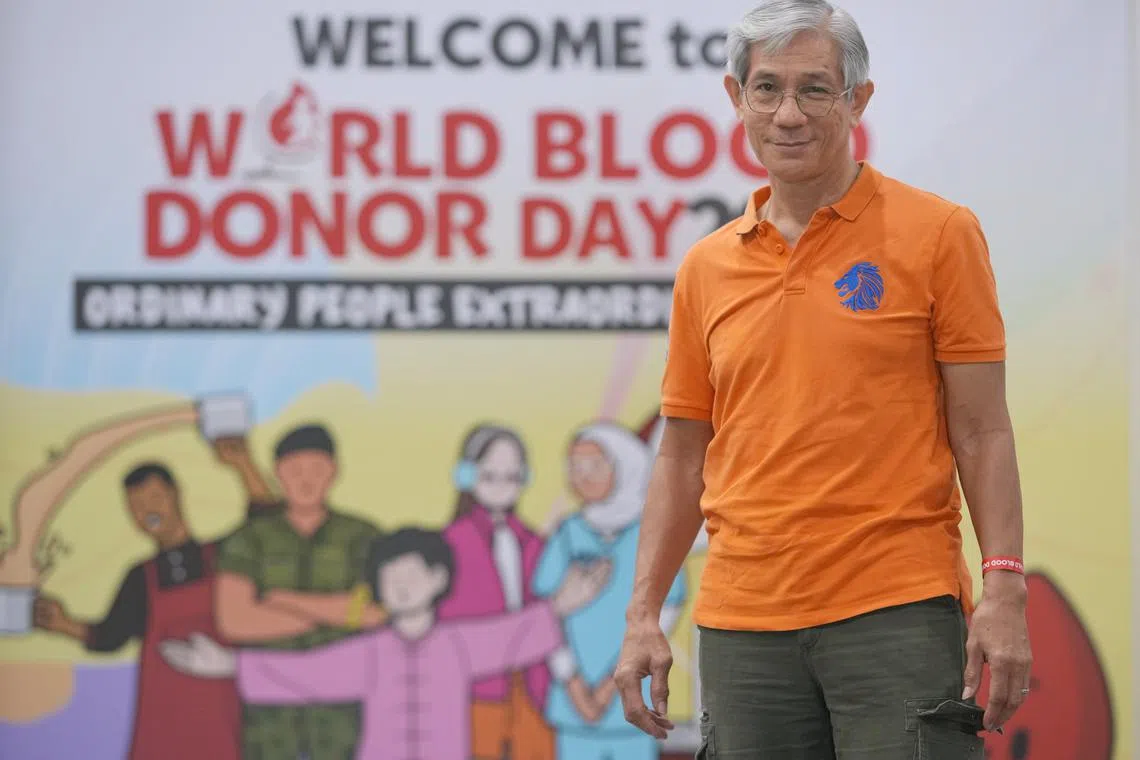Singapore eases blood donation restriction to expand donor pool
Sign up now: Get ST's newsletters delivered to your inbox

Health Minister Ong Ye Kung speaking at the World Blood Donor Day event on June 17.
PHOTO: LIANHE ZAOBAO
SINGAPORE – Potential blood donors who have for decades been unable to give blood can soon do so, as the Republic will lift a longstanding restriction aimed at curbing the spread of variant Creutzfeldt-Jakob Disease (vCJD), or mad cow disease.
On Saturday, Health Minister Ong Ye Kung made an appeal for those with O+ and O- blood types to give blood and raise national blood stocks, and launched a new award to encourage more youth to become regular donors.
As vCJD can incubate in a person for several decades and there are no reliable screening tests for it, many countries have taken a blunt approach by disallowing blood donation from people who have lived for a period in countries such as the United Kingdom, Ireland and France, said Mr Ong.
Current scientific evidence shows that the risk of vCJD transmission from transfusion of blood that has had the white blood cells removed from it is low.
Countries such as the United States and Australia have lifted the geographical risk restrictions.
White blood cells, which can potentially transmit the disease, can be separated from donated blood without significantly affecting its quality, said Mr Ong, who was at an event at the Singapore Expo to mark World Blood Donor Day.
Mr Ong said that given the current international evidence, Singapore will relax its restrictions in the later part of 2023.
“This will contribute to a more stable blood supply in Singapore,” he said.
However, donors affected by the curbs will be allowed to do only apheresis donation for now, as this method uses a machine to allow direct collection of blood with the white blood cells removed.
Those interested in donating blood this way can do so at the Health Sciences Authority’s (HSA) blood bank in Outram once the restriction is lifted.
Noting that blood usage has increased in recent months as hospitals catch up on surgical procedures and treatments postponed during the Covid-19 pandemic, Mr Ong appealed to those of the O blood group to come forward.
As at Friday, stocks of blood types O+, O- and AB- were low,
Type O blood is important as O- is the universal blood type for transfusions, while more than 80 per cent of the population can receive O+ blood. More than 34,000 patients benefited from blood donations in 2022.
Blood donation typically gets disrupted during the June school holidays as people returning to Singapore from certain countries are not allowed to donate blood for a number of weeks, Mr Ong said.
“So my appeal to donors and potential donors is to make it a habit to donate blood before you travel, whether now, during the National Day public holiday or towards the year end,” he said.
“This will help to raise our blood stocks to healthy and sustainable levels.”
A new award for young blood donors will honour those aged 16 to 25 who achieve 20 donations by the age of 25 – an average of two blood donations a year over a decade. On Saturday, 39 people received this Youthphoria award.
One of them is Mr Edwin Sia, who started donating blood at 16, having been inspired by his mother and brother, who are regular blood donors.

Mr Edwin Sia was one of 39 people who received the Youthphoria award, for achieving 20 blood donations by the age of 25.
PHOTO: COURTESY OF EDWIN SIA
The 22-year-old polytechnic student has already donated blood more than 20 times. By telling his story, he hopes to encourage his peers to make blood donation a part of their lifestyle.
Less than 2 per cent of Singapore’s residential population are blood donors. Despite a 7 per cent increase in the total number of blood donors, the proportion of youth donors aged 16 to 25 fell by 10 per cent from 2021 to 2022.
In 2021, youth made up 20 per cent of all blood donors. More than a decade ago in 2011, they accounted for 33 per cent.
That about 600 blood donors stop donating blood each year owing to age or illness accentuates the need for more youth donors, said SRC vice-chairman Tan Poh Hong.
The event on Saturday saw 1,876 blood donors and 29 blood-drive partners honoured by SRC and HSA.
Among them was Mr Johnathan David, 62, who received the Medal for Life award for male donors who have donated blood at least 200 times.

Mr Johnathan David received the Medal for Life award for male donors who have donated blood at least 200 times.
PHOTO: LIANHE ZAOBAO
He saw the need to donate blood after the Spyros tanker explosion at Jurong Shipyard in 1978, and started his blood donation journey in 1979, when he turned 18. He made his 214th donation recently.
Mr David, who does part-time delivery of medical supplies, has inspired his wife and a friend to be blood donors too. To retain his eligibility as a donor, he diligently maintains a healthy lifestyle and diet.
“I hope that those who are younger can see that a man in his 60s can still be actively donating blood components that are critical for saving lives,” he said. “And if I can do it, they can too.”


